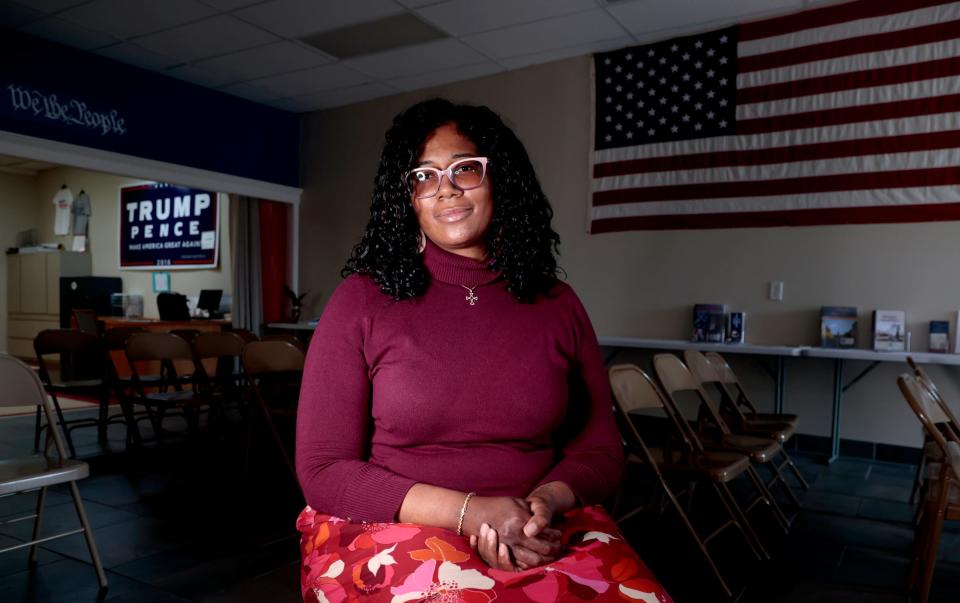New presidential delegate system sparks dispute among Michigan Republicans
LANSING — The Michigan Republican Party is split over a plan party leaders approved over the weekend to award delegates for next year's national convention to select the party's presidential nominee.
Under the plan, approved Saturday at a closed-door meeting of the party's state committee in Grand Rapids, 16 of the party's 55 convention delegates would be awarded based on the Michigan primary election planned for Feb. 27 and the other 39 delegates would be awarded based on 13 district caucuses held March 2, according to a copy of the resolution.
In recent history, the party's convention delegates have been chosen based on results in an open primary election, which in 2020 was held March 10.
Some opponents say the new plan unfairly favors former President Donald Trump and disenfranchises many Republican-leaning voters. Some proponents say the plan is a sensible compromise after state Democrats and the Democratic National Committee put most of the state's GOP convention delegates at risk by moving up the date of Michigan's primary, from March to February, in violation of Republican National Committee rules that say only Iowa, New Hampshire, South Carolina, and Nevada can hold nominating contests before March 1.

"The Michigan Republican Party stands firmly against any attempts to diminish representation of Michigan Republicans," Kristina Karamo, the state party chair, said in a news release after the vote.
The plan still requires approval from the RNC, and Josh Putnam, a national expert on the presidential nomination process, said it's not clear the plan complies with all national party rules.
State party officials said the plan was developed in consultation with the RNC, and it seems like an attempt at a compromise, said Putnam, a political scientist who runs the website FrontloadingHQ.
Putman said in a Monday email to the Free Press that "all signs point toward MIGOP and the RNC striking a deal on the terms of a waiver."
More: Kristina Karamo wants ‘revolutionary change’ for Michigan’s GOP: How she plans to do it
More: Michigan Republican Party reliant on just 2 donor families, records show
Earlier, in a Sunday posting on his website, Putnam said Michigan is still a swing state and national party officials would likely prefer a primary to improve GOP chances of winning Michigan in the general election, since those who vote in a primary are more likely to vote in the general. State party leaders, concerned about Democrats participating in the Republican primary, would prefer holding caucuses, he said.
"Why not a little bit of both?" Putman wrote. "The RNC gets the primary, but the state party gets its caucuses and those 13 contests settle the allocation of the majority of Michigan’s apportioned delegates. Only, to do that, the state party would need a waiver from the RNC."
The party resolution is conditional on receiving that waiver by July 21.
Legal challenges are possible. Republican consultant and commentator Dennis Lennox said in a weekend memorandum the plan "creates a process more corrupt than the purported elections of banana republics," partly because it would award most of the GOP delegates through a caucus process in which precinct delegates would be given priority consideration.
But Dan Wholihan, a member of the Michigan GOP state committee from Brighton, said on Twitter the plan represents the best option of those available to the party.
"I have reservations about it, but it doesn’t scrap the primary and it is better than taking the (RNC) penalty," said Wholihan, who said he opposed moving to a full caucus system because it would disenfranchise many voters, including his parents. Under the plan the party approved, "everyone can still vote," he said.
One other complication is that as things stand now, the law Michigan's Democratic-controlled Legislature passed to move the primary date earlier would not take effect until after the Feb. 27 primary is scheduled to happen, meaning the primary could not be held that early. For that to change, either Michigan Republicans would have to help the law receive immediate effect in the state Senate or Democrats would have to adjourn the Legislature earlier than normal.
The Republican National Convention is set for July 15-18 next year in Milwaukee. In addition to Trump, the front-runner, candidates include Florida Gov. Ron DeSantis and former Vice President Mike Pence.
Contact Paul Egan: 517-372-8660 or pegan@freepress.com. Follow him on Twitter @paulegan4.
This article originally appeared on Detroit Free Press: Michigan GOP split over new plan to select presidential delegates

